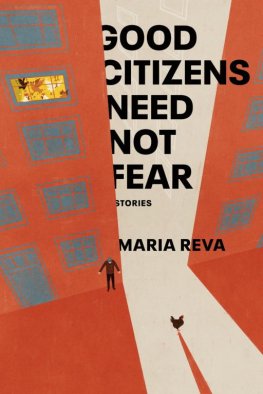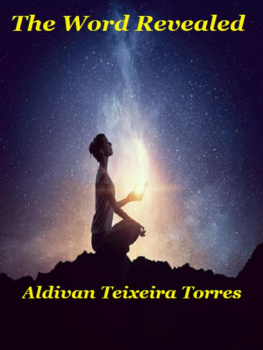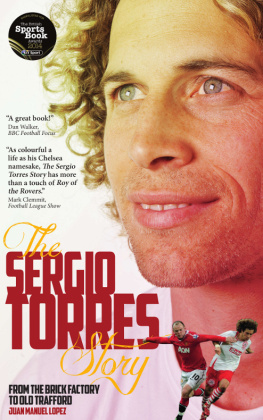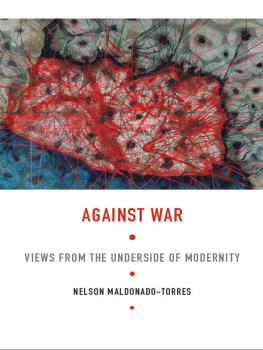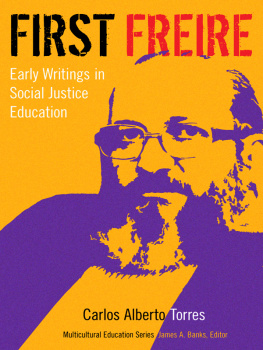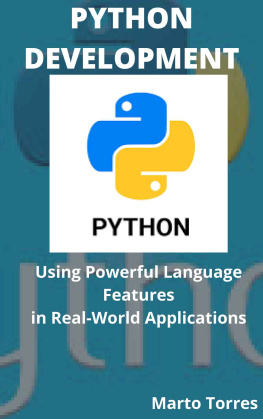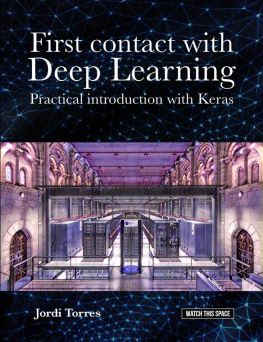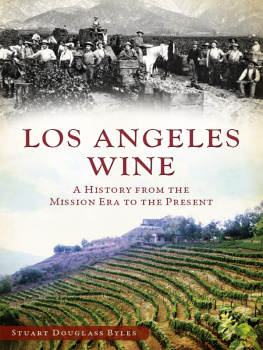CITIZENS IN THE PRESENT
Youth Civic Engagement in the Americas
MARIA DE LOS ANGELES TORRES
IRENE RIZZINI
NORMA DEL RO
UNIVERSITY OF ILLINOIS PRESS
URBANA, CHICAGO, AND SPRINGFIELD
2013 by the Board of Trustees of the University of Illinois
All rights reserved
Manufactured in the United States of America
1 2 3 4 5 C P 5 4 3 2 1

This book is printed on acid-free paper.
Library of Congress Control Number: 2013938955
In Memory of Harold Richman and Pastora San Juan Cafferty And with Special Appreciation to Matthew Piers, Malcolm Bush, and Ignacio Durn
The two antagonistic forces of past and future are both indefinite as to their origin; seen from the viewpoint of the present in the middle, the one comes from an infinite past and the other from an infinite future. But though they have no known beginning, they have a terminal ending, the point at which they meet and clash, which is the present.
Hannah Arendt, Thinking
Hold to the now, the here, through which all future plunges to the past.
James Joyce, Ulysses
Illustrations
Preface
As we finished this manuscript in the spring of 2012, young people were back on the front pages of political news. From the Arab Spring uprisings to the pro-immigrant marches throughout the world to the Occupy Wall Street movementsto name a fewyoung people have become protagonists of protest movements and efforts to find alternative ways of thinking about equality, inclusiveness, and fairness in a globalizing world. Many have moved outside traditional forms of political activism to engage in nontraditional arenasmany of them privatethat influence their lives.
Who are these young activists? What influenced them to step out of their private lives and engage in public battles? If forms of traditional democratic practices were being undermined by a rapidly accelerating unequal distribution of wealth and power and its consequences on the blurring of private/ public spaces, how do they engage to effectively influence institutions in urban spacesincreasingly becoming the place for the majority of young people in the worldthat affect their lives? And what are their ideas about politics? Our study aimed to understand the trajectories of youth activists. We recorded the narratives of young people working to improve their lives and their neighborhoods in three global cities. As such it is a book about how they became engaged, what kinds of activities they pursued, and how they envisioned their world.
Our perspective is interdisciplinary, and as such the questions that guided our project came from our respective fields; psychology, sociology, and political science. Early childhood influences are critical to the well-being of young adults; do they also influence political behavior in later lives? How do young people identify their collective selves and how do they mobilize? What are the philosophical underpinnings of how young adults envision their world, their place, and government's role in it?
The sites of our study were global cities in the Americas; while each city has a very distinct history and political culture, collectively these cities allowed us to engage in a hemispheric comparative exercise that gave as an opportunity to search for commonalities and differences.
We shared a deep respect for young activists and a desire to understand their contributions to the broader questions of civic engagement, personal responsibilities, and the state of democracies in these global cities. As Hannah Arendt so aptly observed, the political is where individuals come together to create futures. It is precisely in political action that the collective is forged and authoritarianism is checked. Even though she was leery of placing children at the forefronts of political struggles, the young people with whom we worked were adolescents and young adults keenly aware of how they were constructed in the media, excluded from the public, and marginalized from the communal polity. They made informed decisions to engage in battles that could let them have an effective voice in decisions that affected their lives and their communities. In the process, they forged new and meaningful political identities.
At the core of our project is also a deep concern about the viability of democracies given the deep inequalities that characterize contemporary societies that are starkly visible in global cities.
Democracies cannot provide citizens with a formal public voice without ensuring some level of equality in the private realm that allows individuals to have an equal footing in institutions that have power over the public realm. Could the practices and ideas of young activists suggest new ways of rethinking democracy and its practices in the age of globalization? We explore these concerns through the narratives of the young people who trusted us with their experiences.
Acknowledgments
It was through Harold Richman that this project became a reality. His lifelong commitment to research and advocacy on behalf of youth around the world helped inspire this project. It is to his memory that we dedicate this book. His invitation to Maria de los Angeles Torres to spend a year as a fellow at Chapin Hall allowed her to develop this project. Through him, Irene Rizzini was introduced to the project, and she in turn brought Norma Del Ro. Very special thanks to Pastora San Juan Cafferty, who made the initial introductions and was a lifelong mentor and friend.
At Chapin Hall, Mark Courtney enthusiastically supported our projectas did Ada Skyles and Robert Chaskin. Miguel Satut, formerly of the Kellogg Foundation, generously supported our efforts, facilitated our meetings, and made possible the three youth publications that emerged from our interviews. Irene Rizzini held two fellowships during the course of the work that greatly aided her participation: the visiting chair in Brazilian Cultural Studies at the Helen Kellogg Institute for International Studies at the University of Notre Dame in 2006 and a John Simon Guggenheim Memorial Foundation fellow in 2008.
At our respective universities we have many to thank, including Nilda Flores Gonzlez, Amalia Pallares, and Ralph Cintron, who participated at the University of Illinois at Chicago's conference on Engaged Youths and gave us critical feedback. Cathy Cohen, Jim Block, and Molly Andolina did as well. Irene Rizzini is grateful for the support for and recognition of her work from her colleagues at the Pontifical Catholic University of Rio de Janeiro. At the Universidad Autnoma Metropolitana, Luz Mara Chapela and Samuel Salinas presented the youths' publication.
We all worked with committed and amazing students: In Chicago, Dolores Muoz, Phoebe Connolly, and Nawojka Lesinski; in Mexico City, Nathalie Coutu and Santiago Martnez Rubio. In Rio, we are grateful to the CIESPI research team, particularly Paula Caldeira, Marcelo Princeswal, Alessandra Caldeira, and Denise Barros. Professor Udi Mandel Butler from Bristol University has made an important contribution to this and other research projects.
Childwatch International gave us the opportunity to meet and discuss our project with colleagues throughout the Americas, especially Gloria Lopez and Yuherqui Guaimaro of CENDIF of the Universidad Metropolitana de Caracas and Graciela Tonon and her team of the Universidad de Lomas de Zamora, Argentina, who are applying our methodology to the study of activists in their respective countries.


 This book is printed on acid-free paper.
This book is printed on acid-free paper.
